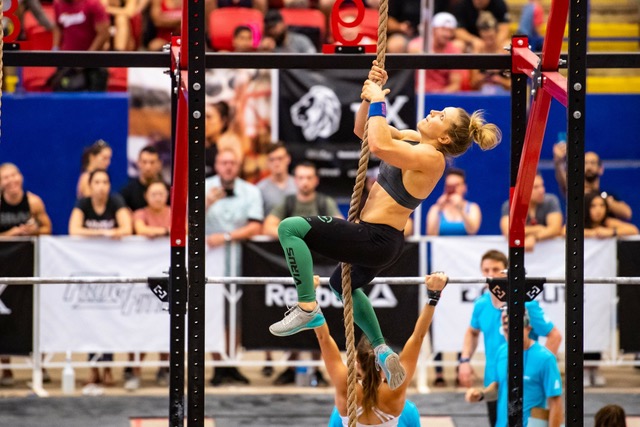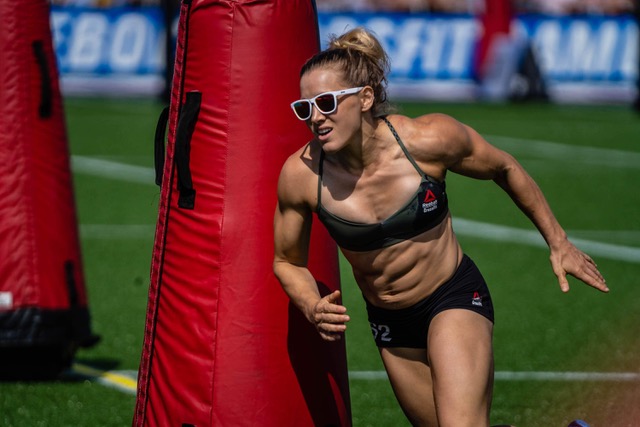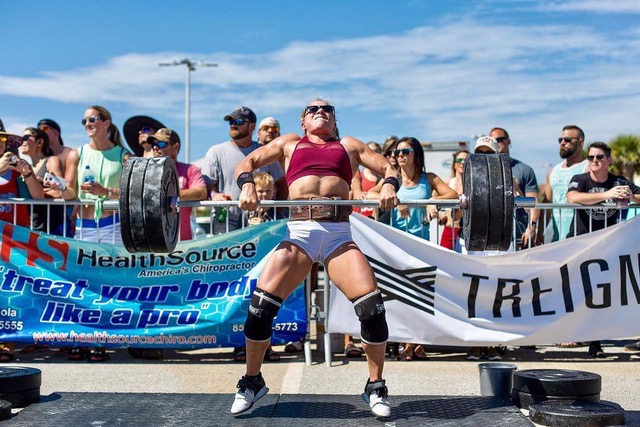Specialized UCL surgical repair leads to speedy recovery for elite CrossFit world competitor

Photo Credit – Ted Bonenfant Photography
Alexis Johnson was performing heavy snatches at a CrossFit gym and a fluke accident caused her to rupture her Ulnar Collateral Ligament (UCL). The good news? She knew just who to call.
“I reached out to Dr. Evan Meeks because he treated me successfully for knee pain five years ago,” said Alexis, who consistently ranks in the top tier of female CrossFit athletes.
Dr. Meeks is an assistant professor in the Department of Orthopedic Surgery at McGovern Medical School at The University of Texas Health Science Center at Houston (UTHealth).
“Dr. Meeks understands an athlete’s lifestyle, and how we must weigh the importance of treatment, rest and recovery with competition timelines,” she said. “He was a college athlete and understands these pressures better than any doctor I’ve seen.”
Alexis was devastated because her UCL injury occurred just seven weeks before the first stage of the CrossFit competition season. She routinely performs snatches and they are known to be one of the most difficult maneuvers because of the demands of power, speed and strength. It’s an Olympic weightlifting exercise, revolving around lifting a heavy barbell. Alexis has a personal record of 187 pounds.
“I was certain my season was over,” she said. “But Dr. Meeks discussed several options, both surgical and non-surgical, and he explained there was an option that would give me a chance to heal and still compete within six weeks. I could not believe that was even possible. I fully expected to be forced to take a year off due to injury.”
Alexis respects Dr. Meeks as a talented surgeon but also praises his excellent communication skills. “He understands the demands of sports and the value of returning to sports after an injury. He listened to what I said about my priorities and my desire to compete and then he let me make a decision that was right for me.”
Dr. Meeks played football for Rice University as a wide receiver. That experience, coupled with his training in the UT sports medicine fellowship and having close friends who were professional athletes, helped him learn about and experience injuries and recovery goals from the athlete’s perspective. “It’s important to consider the entire picture including potential professional career, contract negotiations, and future draft status when discussing plans and recovery,” he said.
“If you fail to see the big picture for the athlete, you inadvertently harm the athlete by taking away from their potential career and/or production.”
Cutting-edge surgical UCL repair option
UCL injuries are usually caused by repetitive overhead movements and stress on the elbow causes microscopic tissue tears and inflammation.

Photo Credit – Ted Bonenfant Photography
On January 29, 2021, Dr. Meeks, who specializes in sports medicine, performed a UCL repair with an internal brace augmentation on Alexis.
“The repair with a protective internal brace enabled Alexis to push her recovery along while protecting the repair,” said Dr. Meeks. “The brace won’t allow stresses to damage or weaken the repair, as long as these stresses are small enough to not overload the brace and cause its failure. “Once the repair heals, the brace is no longer necessary, but does add a degree of protection from possible future injury.”
He praises Alexis for understanding the sacrifice that an elite athlete must make to keep their body healthy and recover from an injury. “Much of it is attitude,” he said, “and how you approach each day with determination and unwavering commitment to improvement. She listens to the plan, and its parameters with both goals and warnings, and this attention to detail is what allows her to push the recovery envelope.”
Dr. Meeks hopes athletes understand “the hard part about staying healthy athletically is doing all of the maintenance work and exercises outside of weightlifting for strength, stretching for flexibility, and conditioning for stamina. It’s hard to hear, ‘Do these exercises and over the next four-six weeks you will feel good.’ We all want a quick and permanent fix with medication or an injection. Doing extra work to take care of your body is what sets many successful athletes apart from their peers who don’t have the focus, dedication or drive to sacrifice in order to put their bodies in the best condition for success.”
What makes a good candidate for this option?
Dr. Meeks explained that for this six-week recovery option, an athlete must be committed to the recovery with no deviation. “They must have elite level support of a physical therapist who is well-read on new techniques and testing during recovery. Only athletes with certain demands on the elbow would be able to recover and return at six weeks. Throwing athletes would take longer.”
Alexis gains fans with her journey from self-destruction to elite athlete
As a youngster, Alexis loved being a competitive gymnast, perfecting her skills five days a week, four hours a day. While a senior in high school, she quit the gym because “my body was beaten up and I wanted to enjoy other activities.”

Photo Credit – FlSportsGuy Photography
Two years later in college, she spiraled into an unhealthy obsession with counting calories. Her goals became centered on how little she could eat. She missed the feeling of accomplishment at meeting gym goals but at 88 pounds she did not have the physical strength to begin CrossFit.
She confesses that an eating disorder took over her life and she credits CrossFit for saving her from a self-destructive path. She turned her life around in 2013, by eating what she could, one day at a time.
Her inspirational story of conquering her eating disorder and her transformational success to be a widely respected CrossFit competitor have earned her devoted followers around the world, with 62K followers on Instagram alone.
Alexis is now committed to be an example to help others who suffer with similar struggles.
Her goals go beyond a passion for CrossFit, heavy weightlifting, personal health and helping others. She obtained a Ph.D. in 2019 from Rice University, specializing in arithmetic number theory, and is now a post-doctoral professor at the University of Minnesota.
“It’s what I can do instead of what I can’t do”
What advice does Alexis have for athletes recovering from an injury?
She knows that a positive mental attitude is everything. “Remember why you started in this sport. It’s because you enjoy being in the gym and being a better version of yourself.”
She knows how difficult it is after surgery. “In recovery, you are often frustrated by your limitations. You ask yourself: Why even go to the gym when I can barely move? I focused on what I could do — squats and the stationary bike. I could do more each day. Every day.”
Thanks to Dr. Meeks, Alexis is in amazing shape and she qualified for the CrossFit worldwide games, meaning she is in the top 120 in the U.S.
“I love working on being the strongest and best version of myself,” she said.